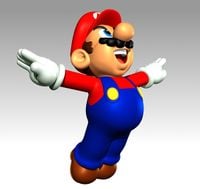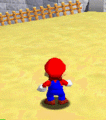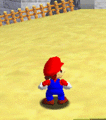Triple Jump
- This article is about a move used in various games. For other uses of the term "Triple Jump", see Triple Jump (disambiguation).
The Triple Jump (alternatively spelled triple jump), also called Multiple Jumps,[1] is a special move used in the Super Mario games since Donkey Kong on Gameboy (except Super Mario 3D Land, Super Mario 3D World, and Super Mario 3D World + Bowser's Fury). Anyone in these games who can double-jump can use this move, with the exception of Yoshi in Super Mario Galaxy 2, who can only double-jump. This jump is even higher than the Double Jump, and the character front-flips during it. To use it, a player must jump three times in a row while moving (whereas the Double Jump can be done on the spot in the 3D games), meaning they need a little space to execute the move.
In Super Mario 64, once Mario acquires 120 Power Stars and talks to Yoshi on the roof of the Mushroom Castle, he can then use an expanded jump that causes him to become invincible during his third jump, protecting him from otherwise damaging falls and enemy attacks. Unlike with the regular Triple Jump, Mario can control its height as well as the extra bounce after landing. With the Wing Cap, Mario can take flight by triple-jumping, and he can do so in place while wearing one.
In Super Mario Sunshine, Mario can also execute a Triple Jump by doing a Spin Jump and jumping again once he lands.
In Super Mario 64, Super Mario 64 DS, Super Mario Galaxy, Super Mario Galaxy 2, and Super Mario Odyssey, if Mario performs a successful Triple Jump and does not move after the final landing, he performs a pose and, in Super Mario 64 and Super Mario Odyssey, cheers. Mario can also perform a Triple Long Jump in Super Mario Odyssey.
Official profiles
Super Mario Sunshine
- Instruction booklet description: "Jump while running, then jump again upon landing. The third consecutive jump will be a forward-flipping, ground-covering super jump!"
Super Mario Maker for Nintendo 3DS
- Digital manual description: "Jump while dashing →
just as you land (repeat twice)"
Gallery
The normal Triple Jump in Super Mario 64, with Mario taking damage upon landing in the empty moat
Names in other languages
| Language | Name | Meaning | Notes |
|---|---|---|---|
| Japanese | 三段跳び[?] San Dan Tobi |
Three-step Jumping | |
| Chinese (simplified) | 三阶段[3] Sān Jiēduàn |
Third Phase | |
| Chinese (traditional) | 3級跳[4] (New Super Mario Bros. Wii) 3 Jí Tiào 三段跳躍[5] (New Super Mario Bros. Wii Iwata Ask) Sānduàn Tiàoyuè |
Three-step Jumping | |
| Dutch | Driedubbele sprong[?] | Triple jump | |
| French (NOE) | Triple saut[?] | Triple jump | |
| German | Dreisprung[?] | Triple Jump | |
| Italian | Salto triplo[?] | Triple jump | |
| Russian | Тройной прыжок[?] Troynoy pryzhok |
Triple jump | |
| Spanish (NOA) | Triple salto Salto Triple[?] |
Triple jump | |
| Spanish (NOE) | Triple Salto Múltiples Saltos[2] |
Triple Jump Multiple Jumps |
References
- ^ a b Super Mario Galaxy 2 move pamphlet
- ^ Super Mario Galaxy instruction booklet, Spanish segment
- ^ Official Chinese website for Super Mario 64 DS. Retrieved March 30, 2020.
- ^ Official Chinese website for New Super Mario Bros. Wii. Retrieved March 30, 2020.
- ^ 社長提問『新 超級瑪利歐兄弟 Wii』. Nintendo. Retrieved March 30, 2020.



